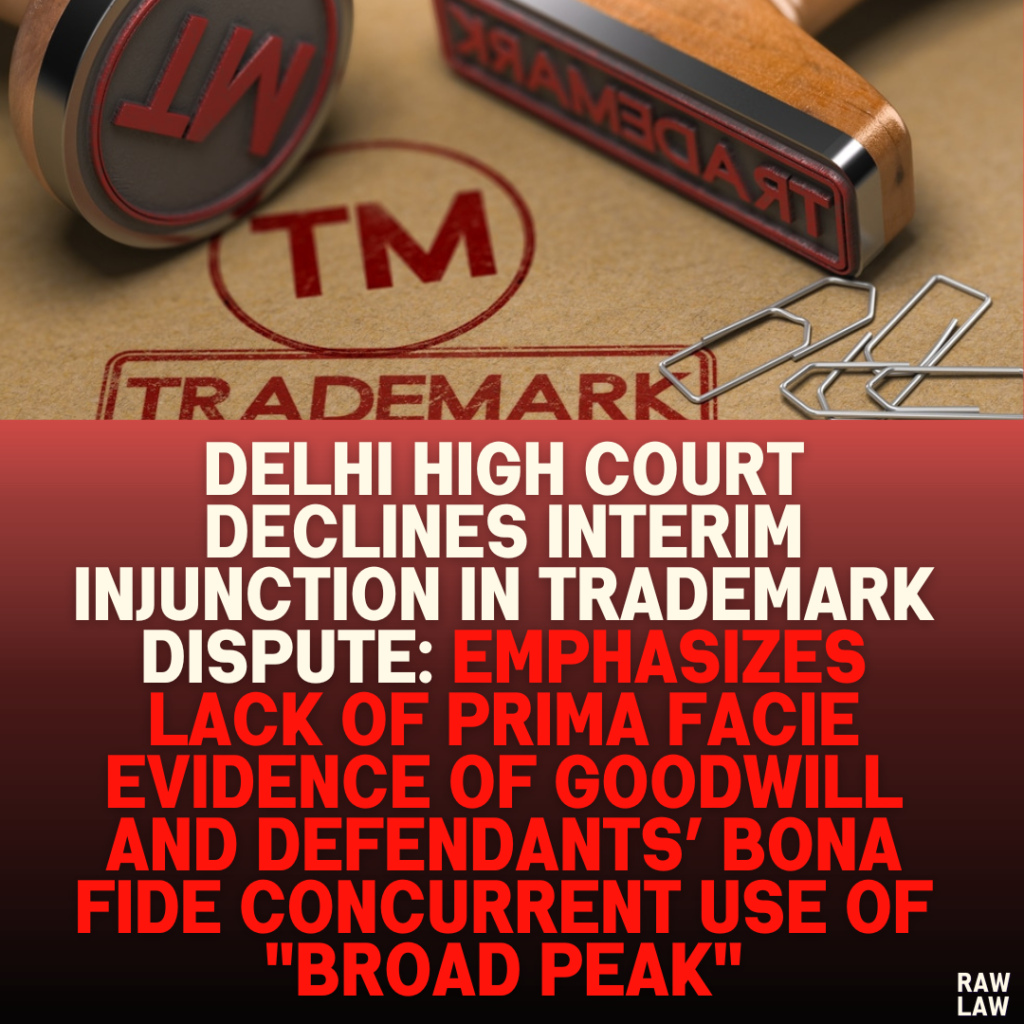Court’s Decision
The Delhi High Court dismissed the plaintiffs’ application for an interim injunction under Order XXXIX Rules 1 and 2 of the Code of Civil Procedure, 1908. The application sought to restrain the defendants from using the trademark “BROAD PEAK.” The court held that:
- The plaintiffs failed to establish prima facie goodwill and reputation in India necessary for an action of passing off.
- The defendants demonstrated bona fide adoption and honest concurrent use of the mark since 2016.
- The balance of convenience favored the defendants, who had continuously used the mark in India since 2016.
Facts
- Plaintiffs’ Background:
- Plaintiff 1 is a Cayman Islands company incorporated in 2006, and Plaintiff 2 is its Singapore-based subsidiary.
- They operate as leading investment advisers for pan-Asia-focused investment funds.
- The plaintiffs have used the trademark “BROAD PEAK” globally since 2006 and secured registrations in multiple jurisdictions, including India in 2017 on a “proposed to be used” basis.
- Defendants’ Background:
- The defendants, under “Broad Peak Capital Advisors LLP,” adopted the mark “BROAD PEAK” in 2016 and registered their domain in October 2016.
- They cater to private equity professionals and investment advisory services.
- Legal Disputes:
- The plaintiffs claimed that the defendants’ use of the mark created confusion in the market and constituted passing off.
- The defendants argued that they were bona fide users of the mark, adopted after conducting due diligence.
- Proceedings:
- The plaintiffs issued legal notices beginning in 2017, but delays in taking further action ensued.
- Both parties initiated rectification petitions against each other’s trademark registrations.
Issues
- Whether the plaintiffs demonstrated goodwill and reputation in India sufficient to support an action for passing off.
- Whether the defendants’ adoption and use of the trademark were bona fide.
- Whether the plaintiffs were entitled to interim relief.
Petitioners’ Arguments
- The plaintiffs emphasized their international goodwill and prior adoption of the mark “BROAD PEAK.”
- They claimed significant reputation globally and alleged that the defendants’ use of the mark caused consumer confusion.
- The defendants’ adoption was described as dishonest, citing their immediate application for registration after receiving legal notices.
- Evidence of market confusion was provided, including misdirected emails and third-party website listings.
Respondents’ Arguments
- The defendants argued they were honest and concurrent users of the trademark since 2016, adopting it after conducting due diligence.
- They claimed the plaintiffs’ delay in taking action indicated acquiescence.
- The businesses of the plaintiffs and defendants were fundamentally different, targeting distinct clientele, thereby minimizing the likelihood of confusion.
- They challenged the credibility of the plaintiffs’ evidence, particularly allegations of market confusion.
Analysis of the Law
- Trademark Infringement:
- Under Section 28(3) of the Trade Marks Act, both parties held registrations for the identical trademark. The court noted that this precludes a prima facie case for infringement.
- Passing Off:
- The court applied the triple test laid down in S. Syed Mohideen v. P. Sulochana Bai, requiring:
- Goodwill and reputation in the mark.
- Misrepresentation by the defendant.
- Damage caused to the plaintiff.
- The plaintiffs failed to establish sufficient goodwill and reputation in India.
- The court applied the triple test laid down in S. Syed Mohideen v. P. Sulochana Bai, requiring:
- Territoriality Principle:
- Referring to Toyota Jidosha Kabushiki Kaisha v. Prius Auto Industries, the court reiterated that international goodwill does not automatically extend to India. Substantial evidence of local goodwill is required.
- Sophistication of Clients:
- Relying on Cadila Health Care v. Cadila Pharmaceuticals and other precedents, the court emphasized that both parties targeted sophisticated, informed clients unlikely to confuse the services offered by the two entities.
Precedent Analysis
- In Toyota Jidosha Kabushiki Kaisha v. Prius Auto Industries, the Supreme Court held that global reputation does not guarantee rights in India without substantial local evidence.
- In Cadila Health Care v. Cadila Pharmaceuticals, the Supreme Court considered the education and sophistication of purchasers when evaluating deceptive similarity.
- In Satyam Infoway v. Siffynet Solutions, the Supreme Court stressed the importance of evidence showing reputation and misrepresentation in passing off cases.
Court’s Reasoning
- Goodwill and Reputation:
- The plaintiffs’ evidence of sporadic transactions in India was insufficient to demonstrate substantial goodwill.
- The absence of widespread advertising or significant market penetration in India weakened their claim.
- Bona Fide Use by Defendants:
- The defendants adopted the mark in 2016 after conducting due diligence, unaware of the plaintiffs’ existence.
- Their continuous use of the mark since 2016 supported their claim of honest concurrent use under Section 12 of the Trade Marks Act.
- Market Confusion:
- The plaintiffs’ evidence of market confusion, such as misdirected emails and third-party listings, was deemed insufficient to establish actual confusion.
- Nature of Clients:
- Both parties targeted highly sophisticated, well-informed clients, minimizing the likelihood of confusion.
Conclusion
The court held that:
- The plaintiffs failed to establish a prima facie case for goodwill or misrepresentation.
- The defendants demonstrated bona fide adoption and honest concurrent use of the mark.
- Interim relief was not warranted as the balance of convenience favored the defendants.
Implications
This judgment reinforces:
- The need for concrete evidence of local goodwill and reputation in trademark disputes.
- The territoriality principle in trademark law, emphasizing local market presence.
- The significance of honest concurrent use and the sophistication of clients in determining consumer confusion.



